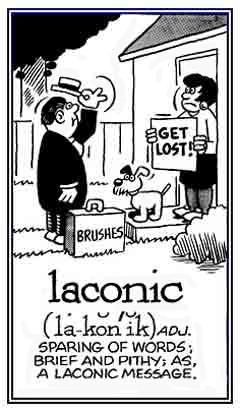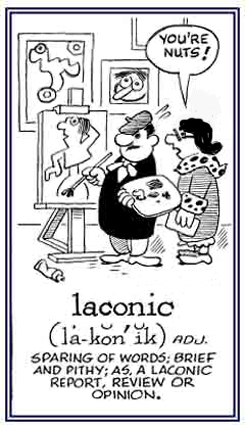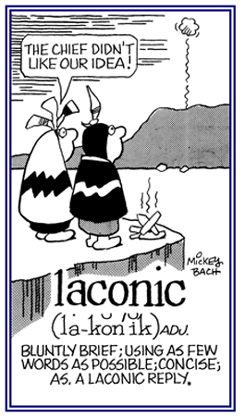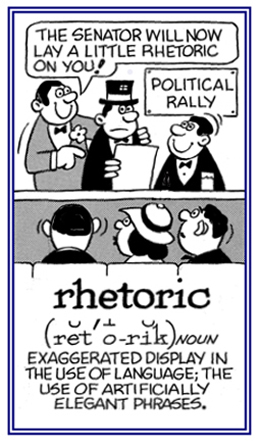-ic
(Greek: a suffix; pertaining to; of the nature of, like; in chemistry, it denotes a higher valence of the element than is expressed by -ous)
2. A reference to the presentation of a brief style of speech: After losing the election, the politician gave his backers a laconic explanation of what probably happened.



Go to this Word A Day Revisited Index
so you can see more Mickey Bach illustrations.
2. Basic principles of reasoning developed by and which are applicable to any field of knowledge: The researchers, Mr. Jones and Mr. Smith, followed the standards set up by the logic of their scientific administers.
3. An effective or convincing force: The logic of Sandra's arguments could not be reasonably challenged.
4. A system of thought or ideas that govern conduct, belief, behavior, etc.: There are currently protestors who are against what they consider to be the logic of some businesses.
5. A system or set of principles that are the basics in a computer or electronic device that perform specified tasks: Chris, the programmer, utilized certain logics so the computer would automatically function to accomplish specific results.
Logic is also used to describe the science that deals with the creation of computer circuits.
6. The non-arithmetical operations in a computer; such as, comparing, selecting, matching, and sorting, where binary or yes-or-no decisions are involved: Data processing usually means the handling of information by arithmetic rules; however in more complex machines, there is the performance of logic operations of "and", "not", and "or".Logic is any process of reasoning that shows you are right.
When dealing with people, remember you are not dealing with creatures of logic, but with creatures of emotion, creatures bristling with prejudice and motivated by pride and vanity.
Politeness is better than logic. You can often persuade when you cannot convince.
2. A reference to a contention about words or an instance of this.
2. The art or science of composing or pleasingly harmonious sounds.
3. The written or printed signs representing vocal or instrumental sounds.
Usually implies sounds with distinct pitches that are arranged into melodies and organized into patterns of rhythm and meter.
The melody will usually be in a certain key or mode, and in Western music it will often suggest harmony that may be made explicit as accompanying chords or counterpoints (art of combining different melodic lines in a musical composition).
Music is an art which, in one guise or another, permeates every human society and it is used for such varied social purposes as ritual, worship, coordination of movement, communication, and entertainment.
2. Sometimes, a meaningless language that is used with an exaggerated style that is intended to impress others: As a typical politician, Quincy used a lot of rhetoric but said nothing of importance; in fact, some people considered his rhetoric as nothing more than hot air, hokum, or bunk.
Mr. Jackson, the candidate, spoke with a fiery political rhetoric that was full of artificial eloquence and verbosity.
There are those who use rhetoric as a verbose, long-winded speech that is meant to impress, but usually falls flat for lack of substance or a deceitful and dishonest use of language in order to manipulate people.
3. Language that is elaborate, pretentious, insincere, or intellectually lacking serious thoughts: Ted's company made offers of compromise to the workers which were mere rhetoric because nothing was ever accomplished.Too often, politicians talk about solutions to the national debt problems, but they usually just offer rhetoric and no significant results.
4. The speech or writing calculated to arouse passion: Imogene asked the group: "Are we ever going to move from empty rhetoric to a sound plan of action on this issue?"5. Etymology: from Old French rethorique, from Latin rhetorice, from Greek rhetorike techne, "art of an orator", from rhetor, rhetoros, "orator"; related to rhema, "word"; literally, "that which is spoken".


